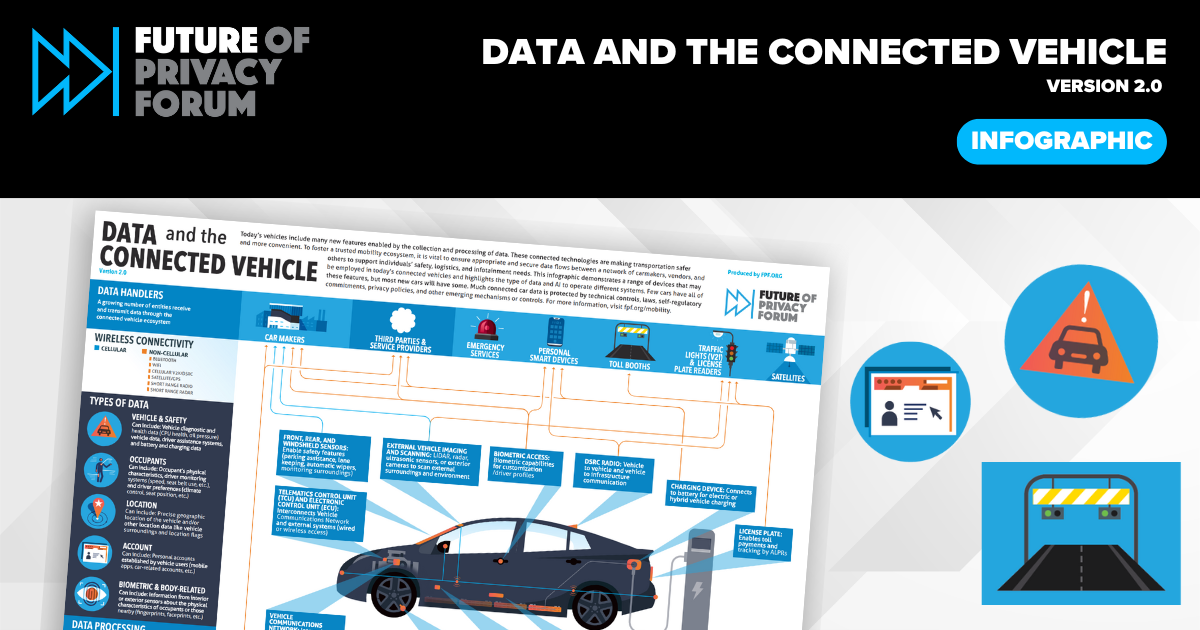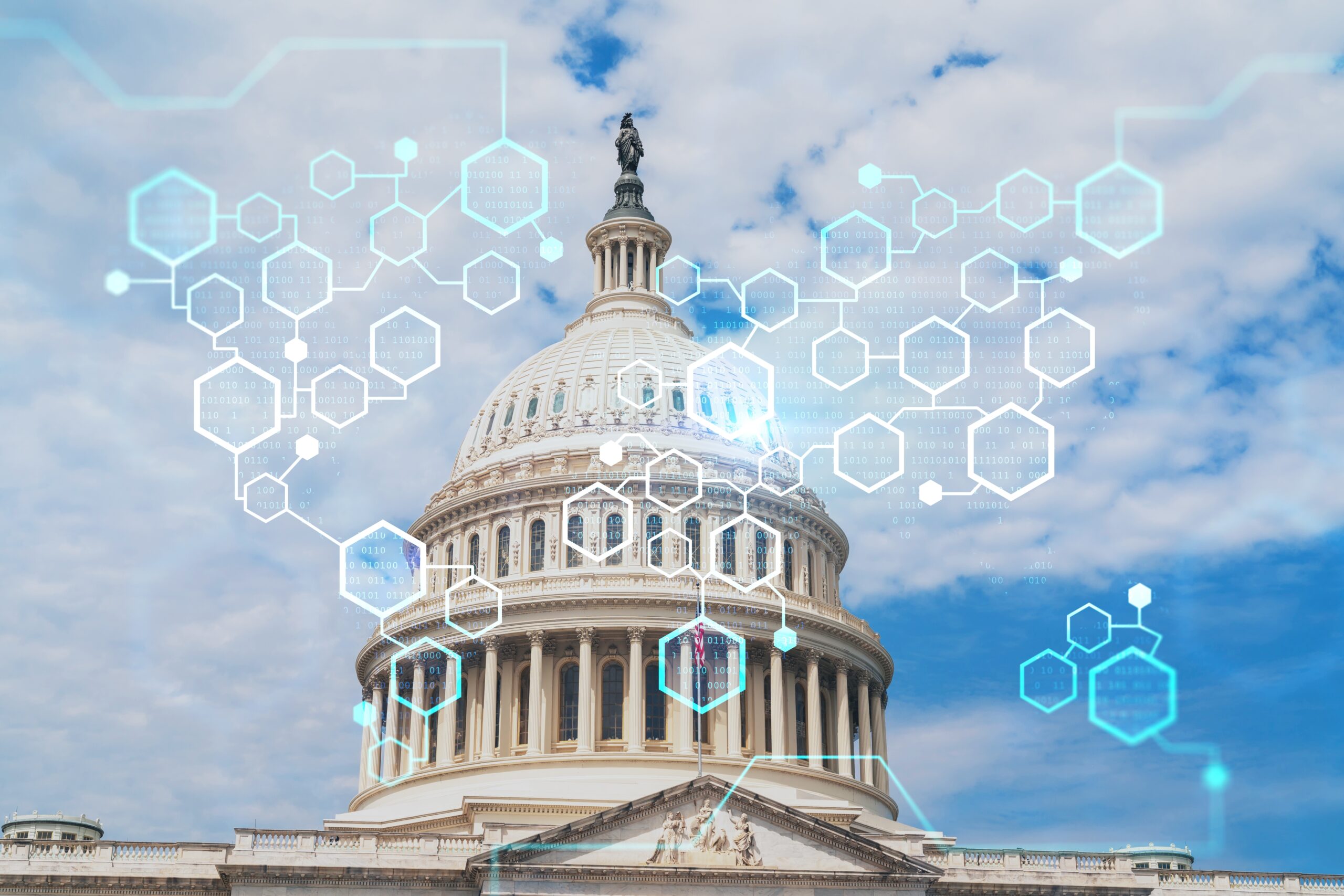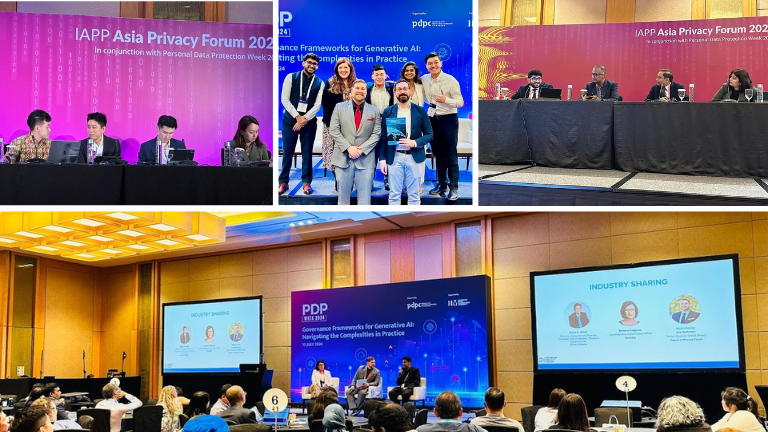
Updated FPF Infographic Explores Data in Connected Vehicles
Today, The Future of Privacy Forum is launching the Data and the Connected Vehicle Infographic 2.0, including new updates to account for the types of data associated with connected vehicles, features in and outside of the vehicle, and data handlers who receive and process data. Lawmakers, manufacturers, privacy professionals, and consumers are actively engaged in […]

FPF_connected_vehicl_v2_03_nosidebar (2)
CELLULARNON-CELLULAR WIRELESS CONNECTIVITY BLUETOOTH WIFI CELLULAR V2X/DSRC SATELLITE/GPS SHORT RANGE RADIO SHORT RANGE RADAR BIOMETRIC & BODY-RELATED Can include: Information from interior or exterior sensors about the physical characteristics of occupants or those nearby (fingerprints, faceprints, etc.) ARTIFICIAL INTELLIGENCE Can include: Algorithmic processing, decision making, and machine learning present throughout various vehicle systems and features […]

FPF Unveils Report on Emerging Trends in U.S. State AI Regulation
Today, the Future of Privacy Forum (FPF) launched a new report—U.S. State AI Legislation: A Look at How U.S. State Policymakers Are Approaching Artificial Intelligence Regulation— analyzing recent proposed and enacted legislation in U.S. states. As artificial intelligence (AI) becomes increasingly embedded in daily life and critical sectors like healthcare and employment, state lawmakers have […]

Five ways in which the DPDPA could shape the development of AI in India
India enacted the Digital Personal Data Protection Act, 2023 (DPDPA) on August 11, 2023, a comprehensive data protection law culminating from a landmark Supreme Court decision recognizing a constitutional right to privacy in India, and discussions on multiple drafts spanning over half a decade. The law comes at a time when, globally, there has been […]

Does the GDPR Need Fixing? The European Commission Weighs In
The European Commission published its second Report on the General Data Protection Regulation (GDPR) on July 25, 2024, assessing the progress of its impact and effectiveness of application since the Commission’s first Report published in June 2020. The second Report acknowledges relative success of the GDPR in protecting individuals and supporting businesses, while also highlighting […]

Comments Submitted to the FCC on Disclosure and Transparency of AI-Generated Content in Political Advertisements
The Future of Privacy Forum (FPF) submitted comments in response to the Federal Communications Commission’s (FCC, or Commission) Notice of Proposed Rulemaking (NPRM) on the use of artificial intelligence (AI) to generate content for political advertisements.

867d56ae-cd8e-4713-98f9-b6556247409c
1350 Eye Street NW ,Suite 350, W ashington, DC 20005 |202-768-8950 |fpf.or g Filed online at fcc.gov/ ecfs August 27, 2024 Marlene H. Dortch SecretaryFederal Communications Commission Of fice of the Secretary 45 L Street NE W ashington, DC 20554 Re: Disclosur e and Transpar ency of Artificial Intelligence-Generated Content in Political Advertisements The Future […]

Privacy Roundup from Summer Developer Conference Season 2024
Ahh, summer. A time for hot dogs, swimming pools, and software developer conferences. For third-party application developers to deliver new tools with the best features for the lucrative fall quarter, they must have access to all the APIs and tools by the summer before. This has meant that early summer has become known as a […]

Comments Submitted to the FCC on Cybersecurity Labeling Program for Internet of Things Devices
The Future of Privacy Forum (FPF) submitted comments in response to the Federal Communications Commission’s (FCC) Further Notice of Proposed Rulemaking on the FCC’s voluntary cybersecurity labeling program for consumer Internet of Things (IoT) products.

Singapore’s PDP Week 2024: FPF highlights include a hands-on workshop on practical Generative AI governance and a panel on India’s DPDPA
From July 15 to 18, 2024, the Future of Privacy Forum (FPF) participated in Personal Data Protection Week 2024 (PDP Week), an event organized and hosted by the Personal Data Protection Commission of Singapore (PDPC) at the Marina Bay Sands Expo and Convention Centre in Singapore. As with PDP Weeks of previous years, programming during […]
